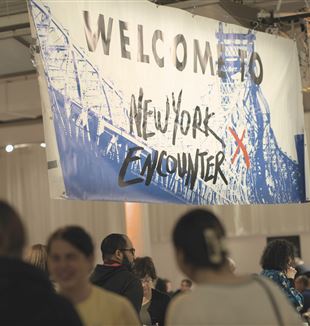
Someone with me
What happened at the New York Encounter? Over the weekend in Manhattan stories, reflections, exhibitions, about a faith in action. At the test of our time. An account of the weekend. From the January issue of Tracce.For a little over a year, Hannah has been in charge of the CL community’s newsletter in the United States. On the eve of the New York Encounter, she asked for advice on how to cover the event. We talked via Zoom and I realized that apart from the technical issues – she does not do this professionally – the questions she asks me are broader and deeper. We agreed that during those days she would listen to some of the interviews I would conduct with some of the speakers "to understand how to do it." Although I have been a journalist for 20 years now, I still feel like a beginner, and the thought of having to teach someone makes me uncomfortable. Arriving in New York, I watched Hannah dart from one meeting to the next. She didn’t miss a single one. There was no time to stop and talk. At one point we passed each other and she said to me, "It's all too much. It seems like every meeting is designed to answer my questions. How can I remain detached to write about it?" I answered, "Who said you have to stay detached?" As I bit into a pulled pork sandwich in the food court of the Encounter, I thought, "Things speak more to those who feel the need most acutely." I feel like I am the one who needs to learn from Hannah.
Pardon the personal tangent, but to summarize what happened in the three-day event in New York – February 17 - 19, entitled "Who am I that you care for me?" – it is precisely what I saw in my fellow American that makes me better understand the theme of this edition: "I yearn for someone who is not uncomfortable with my brokenness, put off by my failures, or embarrassed by my sadness,” the organizers wrote, “Someone who values my deeper questions, who is certain of the meaning of life and walks with me to meet it. Someone who knows me and, inexplicably, really cares for me.”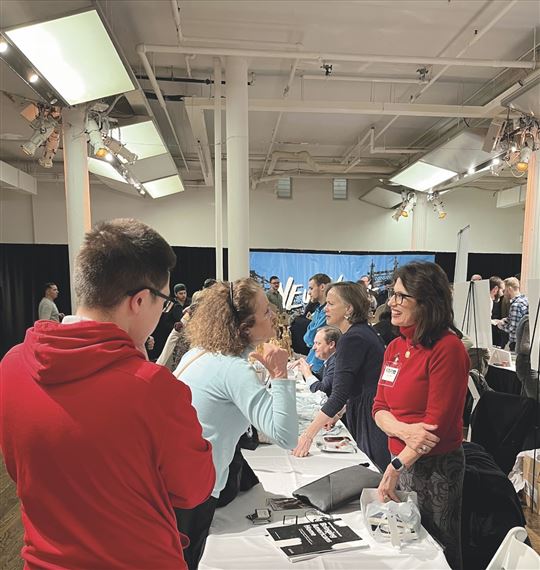
The Encounter, which grew out of the experience generated by Fr. Giussani, bets everything on the possibility of encountering a faith in action. The first impact was with the 300 volunteers, who had come from every state in America. They wore yellow T-shirts and welcomed the 12,000 or so visitors who crossed the threshold of this year's Metropolitan Pavillion on West 18th Street, between 6th and 7th Avenues, just a few blocks away from the iconic Flatiron Building, which stands out elegantly over Madison Square Park. Then there were the sixty speakers who animated the twenty-four events of the weekend, each with their own story to tell. This was a sui generis event in the context of American Catholicism because of the variety of the topics covered. In addition to testimonies of Christian life and speeches by prelates of all ranks, this year's focus was on influencers, cryptocurrencies, poetry, diversity (a crucial and much-discussed topic in Anglo-Saxon society), inflation, space telescopes, and recovery communities for drug addicts. Then, in addition to the exhibit on Fr. Giussani, there were several other exhibitions: "Nietzsche's Urge for the Truth," on how the European philosopher's thought conditions the common mentality of contemporary America; "Signs Awaiting Discovery: The Story Rocks Tell Us," because wonder is not only about the starry sky; another on the Servant of God Enzo Piccinini; and, finally, "Why We Work. Daily Bread, Dynamic Times," a journey on the questions that arise in the sphere of work at the time of "great resignation" (between April and September 2021, 19 million Americans voluntarily quit their jobs). 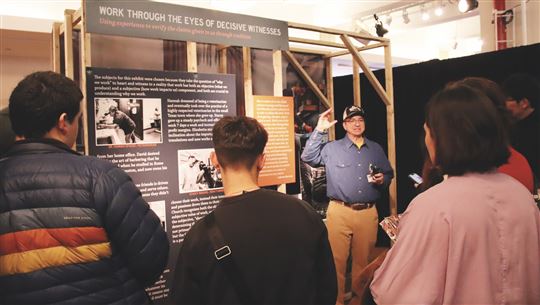
The inaugural meeting, dedicated to the figure of Benedict XVI, opened with a performance by Bogoroditsye Dyevo, Sergei Rachmaninov's poignant Ave Maria. "In a couple of years, in 2025, we will be celebrating a new Jubilee, it will be the year of the 'pilgrims of hope,'" said Cardinal Sean O'Malley, Archbishop of Boston and a regular visitor at the Encounter: "Benedict has always shared the 'reasons for his hope' and has reached out to all of us with those reasons and with the example, goodness and holiness of his life." Monsignor Steven Raica, Bishop of Birmingham (Alabama), instead evoked Pope Ratzinger's last words and compared them to the ending of John's Gospel: "I imagine the same scene happening on the shore of eternity. Yes, even with the fish roasting on the fire. "Joseph, do you love me?" 'Yes, Lord, you know I love you.'"
Music was again the protagonist of the recital "The Thinking Heart of the Barracks," a journey through the writings of Etty Hillesum, a young Dutch Jewish woman who died in Auschwitz in 1943, accompanied by original music reflections by Jonathan Fields, a Jewish composer who converted to Catholicism. Also from captivity comes the testimony of the figure of Servant of God Fr. Emil Kapaun, a military chaplain who died during the Korean War and became a national hero. One of his fellow soldiers said that "by his very presence he [Kapaun] could transform a stinking mud hut full of lice, at least for a while, into a cathedral."
Hillesum and Fr. Kapaun were someone with me, to quote the title of the dialogue on the Encounter’s theme. The protagonists: Christophe Pierre, Apostolic Nuncio to the United States, also a regular guest here, and Monsignor Erik Varden, Cistercian and bishop of the Norwegian Diocese of Trondheim. The latter, at one point, said, "The desire for comfort, the desire to be known, to be seen, loved, the desire for infinity, which we carry within us.... All these stupendous aspirations are, in fact, real aspirations that correspond to a real object, which by grace is at hand and reaches us." And then, "When we enter the life of Christ, people notice, just as if we had appeared, suddenly, in a miraculous glow of light." 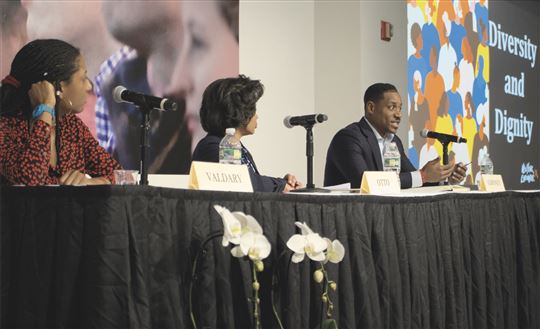
Varden speaks of the encounter between man's desire for the infinite and the surprise of revelation. This is the focus of Fr. Giussani's most famous book, The Religious Sense, whose new translation was presented in New York. It was discussed by Fr. Michael Carvill, responsible of CL in the States, and theologian John Cavadini, of the University of Notre Dame. "The religious sense is a structural need," Carvill recalled, "That is, something we all have, like we all have a nose and two eyes. It is part of who we are. It is not a choice, it is not an acquired ability. It is something that is simply there, in us, that defines our humanity." For his part, Cavadini recounted how he was moved when he got to the last page of the book and read:
"This openness must prevail if life is to be realized. The destiny of the 'religious sense' is totally tied to it. This is the frontier of human dignity: 'Even if salvation does not come, still I want to be worthy of it in every instant (Franz Kafka)." Re-reading it in front of the New York audience, his voice trembled.
But if the Encounter is an expression of a cultural vibrancy, grounded in St. Paul’s "test them all; hold on to what is good,” understood by Cardinal Timothy Dolan, Archbishop of New York, as a realization of the relationship between Church and world proposed by the Second Vatican Council, it is also true that the event is an opportunity for the CL community, scattered between the East and West coasts, to meet each other and invite new friends. Like Cecilia, a Swiss girl from Washington, who brought with her two moms from her daughter's class. For Riro Maniscalco, the Encounter's longtime president who now lives in Minnesota, it was a chance to see again the many friends he has spent a lifetime with in New York. He happened to be stopped by a big man who greets him but whom he does not recognize, "Don't you remember? Twenty years ago I used to come to your School of Community.... Lately I've been longing to see you again." 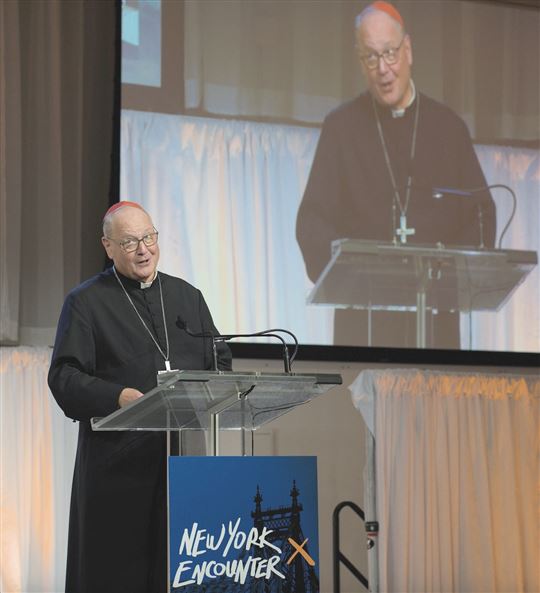
That hope through the bends, even tragic ones, of life is kept awake by encountering a living people is understood well during the meeting "You will never succeed in convincing me to hate you." In addition to Monsignor Pierbattista Pizzaballa, Latin Patriarch of Jerusalem, Anastasia Zolotova, a Ukrainian refugee in Italy, and Diane Foley, the mother of James, the first journalist to be decapitated by Isis terrorists, were also there. Anastasia recounted that in recent months, although circumstances have led a great many of her fellow citizens to hate the Russian invaders, she could not be convinced that the war was "destroying her life." One of the reasons, she said, was that while her city was being bombed and her people killed, she saw all the good that she and her family were receiving from those who had taken them in. Diane Foley, on the other hand, had to go through the two-year ordeal of not being able to hear from her kidnapped son. The U.S. government did not negotiate with the kidnappers. And when news of her son's barbaric killing reached her, she had to come to terms with her anger toward the murderers, but also her anger toward those who had done nothing to bring Jim home. "But I didn't want to remain a prisoner of pain and resentment. I had to go beyond that; I am not meant to stay in hatred, life is given to us to be happy. How was it possible to overcome that moment? Thanks to faith and the enormous affection received from friends and the Christian community." Again, someone with me.
Read also - New York Encounter: the first Easter and peace
The theme of war and the "prophecy for peace" emerged, inevitably, at the Encounter. The intention of the Mass, celebrated by O'Malley with six bishops and some 50 priests, was to support Pope Francis' prayer for peace. Reconnecting the thread with the invitation addressed to CL at the October 15 Audience in St. Peter's Square was Davide Prosperi: "Our responsibility, even as a movement, is above all to build patiently, day after day, places of education and hope, fostering relationships in which the gaze on the other is inclusive of who he or she is. The task we feel as Christians is to witness in our daily work that only hope can build."
On the same day they returned to the theme of war with Monsignor Gabriele Caccia, Permanent Observer of the Holy See to the UN, and with Monsignor Borys Gudziak, Metropolitan Archbishop of Philadelphia of the Ukrainian Catholic Church. While Caccia took up the Church's doctrine on conflict and what it entails, Gudziak emphasized the challenge that what is happening in his country poses to all Christians: "Every joy shared is doubled and every pain shared is halved. Keep doing what you are doing. Pray. Inform yourselves. Help as you can. We cannot stop a tsunami, but we can witness. In the face of evil, we can live the life of giving and refuse to grasp the fruit of sin. Sooner or later God's truth will prevail. He always does. And in this trust lies our peace in this world."